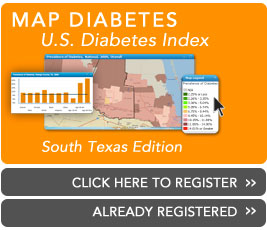Stories written by Diabetes Rio Grande
Posted by Diabetes Rio Grande
News
Friday, February 5th, 2016

Ann Intern Med, 1 December 2015
Description: Update of the 2008 U.S. Preventive Services Task Force (USPSTF) recommendation on screening for diabetes in asymptomatic adults. …
Recommendation: The USPSTF recommends screening for abnormal blood glucose as part of cardiovascular risk assessment in adults aged 40 to 70 years who are overweight or obese. Clinicians should offer or refer patients with abnormal blood glucose to intensive behavioral counseling interventions to promote a healthful diet and physical activity Read more.
Posted by Diabetes Rio Grande
News
Friday, February 5th, 2016

Photo by DARPA
NIH Director’s Blog, 10 November 2015
In recent years, there’s been a lot of talk about how “Big Data” stands to revolutionize biomedical research. Indeed, we’ve already gained many new insights into health and disease thanks to the power of new technologies to generate astonishing amounts of molecular data—DNA sequences, epigenetic marks, and metabolic signatures, to name a few. But what’s often overlooked is the value of combining all that with a more mundane type of Big Data: the vast trove of clinical information contained in electronic health records (EHRs).
In a recent study in Science Translational Medicine, NIH-funded researchers demonstrated the tremendous potential of using EHRs, combined with genome-wide analysis, to learn more about a common, chronic disease—type 2 diabetes. Sifting through the EHR and genomic data of more than 11,000 volunteers, the researchers uncovered what appear to be three distinct subtypes of type 2 diabetes. Not only does this work have implications for efforts to reduce this leading cause of death and disability, it provides a sneak peek at the kind of discoveries that will be made possible by the new Precision Medicine Initiative’s national research cohort, which will enroll 1 million or more volunteers who agree to share their EHRs and genomic information. Read more.
Posted by Diabetes Rio Grande
News
Friday, February 5th, 2016
JAMA, 8 September 2015
Importance Chronic diseases have overtaken acute diseases, such as infections, as the major cause of premature mortality worldwide. Diabetes mellitus, a chronic degenerative metabolic disease, has reached epidemic proportions in the past 30 years, with worldwide prevalence approaching 400 million people. …
Conclusions and Relevance Improved glycemic control and better management of other identified risk factors for the complications of diabetes and more effective treatment of cardiovascular disease and microvascular complications have resulted in a more optimistic outlook for people with diabetes. This review focuses on recent advances in diagnosis and management and the remaining challenges in the prevention and treatment of diabetes mellitus. Read more.
Posted by Diabetes Rio Grande
Minority Diabetes Reports
Friday, February 5th, 2016

J Clin Endocrinol Metab, 6 January 2016
Context:
A higher prevalence of diabetes-related complications is reported in minority populations; however, it is not known if there are racial disparities in diabetes care and outcomes in hospitalized patients.
Objective:
To determine the association between hyperglycemia, in patients with and without DM (non-DM), and complications among different racial groups. …
Conclusions:
Black patients have higher rates of hyperglycemia and diabetes, worse inpatient glycemic control, and greater frequency of hospital complications compared to Whites. Non-DM Blacks with hyperglycemia are a particularly vulnerable group. Further investigation is needed to better understand factors contributing the racial disparities in the hospital. Read more.
Posted by Diabetes Rio Grande
Clinical Trials
Friday, February 5th, 2016

Photo by Gveret Tered
Am J Clin Nutr, 16 December 2015
Background: In contrast with some epidemiologic evidence, our previous research showed that a 4-wk diet that was high in low-fat dairy reduced insulin sensitivity compared with the effect of a diet that was high in red meat.
Objective: We investigated whether a dairy meal would produce a greater insulin response than a carbohydrate-matched red meat meal would, which might account for the change in insulin sensitivity. …
Conclusions: Lean red meat and low-fat dairy produced a similar glycemic response. The higher glucose response 30 min after consumption of the red meat meal was likely attributable to differences in the glycemic load between orange juice and milk and yogurt. An insulinotropic effect of dairy was not observed. Read more.
Posted by Diabetes Rio Grande
News
Friday, February 5th, 2016
Prev Chronic Dis, 3 December 2015
Introduction
This study aimed to assess the trends in tooth loss among adults with and without diabetes mellitus in the United States and racial/ethnic disparities in tooth loss patterns, and to evaluate trends in tooth loss by age, birth cohorts, and survey periods. …
Conclusion
Substantial differences in tooth loss between adults with and without diabetes and across racial/ethnic groups persisted over time. Appropriate dental care and tooth retention need to be further promoted among adults with diabetes. Read more.
Posted by Diabetes Rio Grande
News
Friday, February 5th, 2016
Houston Public Media, 16 November 2015
Researchers at the University of Texas School Of Public Health say residents in certain parts of Houston are more vulnerable to getting diabetes.
The research is part of a project called Cities Changing Diabetes. Stephen Linder is a professor at the University of Texas School of Public Health. His team interviewed hundreds of residents across Greater Houston on their health habits and lifestyle. Read more.































